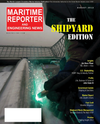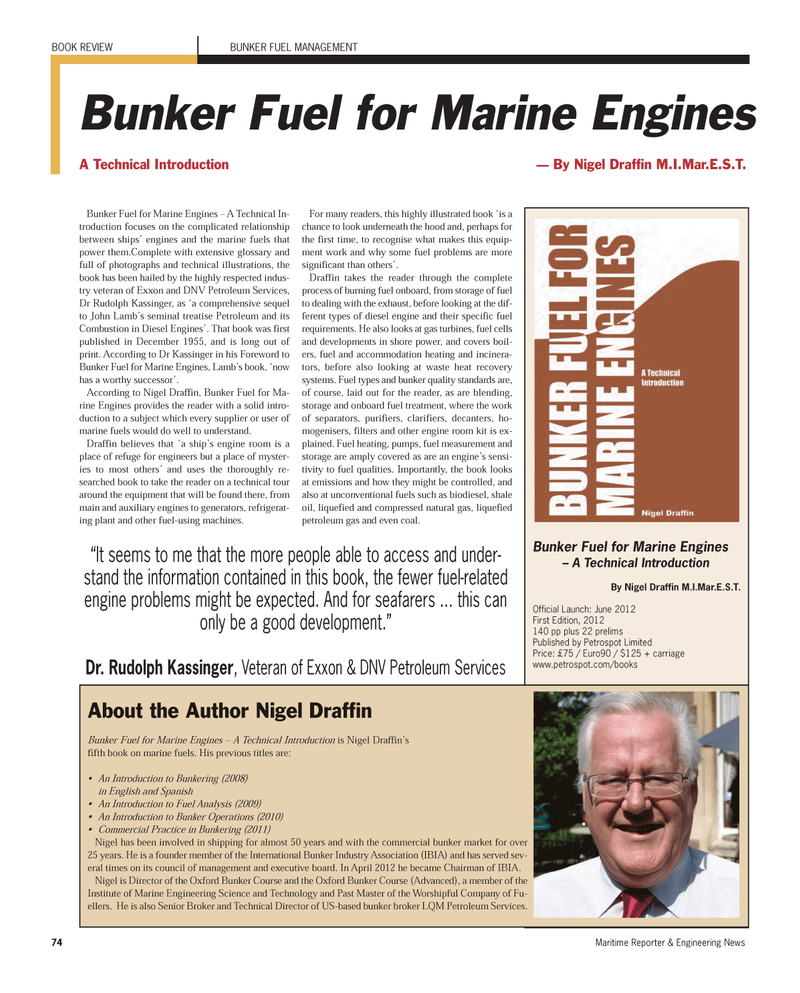
Page 74: of Maritime Reporter Magazine (August 2012)
The Shipyard Edition
Read this page in Pdf, Flash or Html5 edition of August 2012 Maritime Reporter Magazine
Bunker Fuel for Marine Engines? A Technical Introduction By Nigel Draffin M.I.Mar.E.S.T. Official Launch: June 2012 First Edition, 2012140 pp plus 22 prelims Published by Petrospot Limited Price: £75 / Euro90 / $125 + carriage www.petrospot.com/books About the Author Nigel Draffin Bunker Fuel for Marine Engines ? A Technical Introduction is Nigel Draffin?s fifth book on marine fuels. His previous titles are: An Introduction to Bunkering (2008) in English and SpanishAn Introduction to Fuel Analysis (2009) An Introduction to Bunker Operations (2010) Commercial Practice in Bunkering (2011) Nigel has been involved in shipping for almost 50 years and with the commercial bunker market for over 25 years. He is a founder member of the International Bunker Industry Association (IBIA) and has served sev- eral times on its council of management and executive board. In April 2012 he became Chairman of IBIA. Nigel is Director of the Oxford Bunker Course and the Oxford Bunker Course (Advanced), a member of the Institute of Marine Engineering Science and Technology and Past Master of the Worshipful Company of Fu- ellers. He is also Senior Broker and Technical Director of US-based bunker broker LQM Petroleum Services. Bunker Fuel for Marine Engines ? A Technical In- troduction focuses on the complicated relationshipbetween ships? engines and the marine fuels that power them.Complete with extensive glossary and full of photographs and technical illustrations, thebook has been hailed by the highly respected indus-try veteran of Exxon and DNV Petroleum Services, Dr Rudolph Kassinger, as ?a comprehensive sequel to John Lamb?s seminal treatise Petroleum and its Combustion in Diesel Engines?. That book was first published in December 1955, and is long out ofprint. According to Dr Kassinger in his Foreword to Bunker Fuel for Marine Engines, Lamb?s book, ?now has a worthy successor?. According to Nigel Draffin, Bunker Fuel for Ma- rine Engines provides the reader with a solid intro- duction to a subject which every supplier or user of marine fuels would do well to understand. Draffin believes that ?a ship?s engine room is a place of refuge for engineers but a place of myster- ies to most others? and uses the thoroughly re- searched book to take the reader on a technical tour around the equipment that will be found there, frommain and auxiliary engines to generators, refrigerat- ing plant and other fuel-using machines. For many readers, this highly illustrated book ?is a chance to look underneath the hood and, perhaps forthe first time, to recognise what makes this equip- ment work and why some fuel problems are more significant than others?. Draffin takes the reader through the complete process of burning fuel onboard, from storage of fuel to dealing with the exhaust, before looking at the dif- ferent types of diesel engine and their specific fuel requirements. He also looks at gas turbines, fuel cells and developments in shore power, and covers boil- ers, fuel and accommodation heating and incinera- tors, before also looking at waste heat recovery systems. Fuel types and bunker quality standards are, of course, laid out for the reader, as are blending, storage and onboard fuel treatment, where the work of separators, purifiers, clarifiers, decanters, ho- mogenisers, filters and other engine room kit is ex- plained. Fuel heating, pumps, fuel measurement andstorage are amply covered as are an engine?s sensi- tivity to fuel qualities. Importantly, the book looks at emissions and how they might be controlled, and also at unconventional fuels such as biodiesel, shale oil, liquefied and compressed natural gas, liquefied petroleum gas and even coal. 74Maritime Reporter & Engineering News BOOK REVIEWBUNKER FUEL MANAGEMENTBunker Fuel for Marine EnginesA Technical Introduction ? By Nigel Draffin M.I.Mar.E.S.T. ?It seems to me that the more people able to access and under- stand the information contained in this book, the fewer fuel-related engine problems might be expected. And for seafarers ... this can only be a good development.? Dr. Rudolph Kassinger , Veteran of Exxon & DNV Petroleum Services MR#8 (74-81):MR Template 8/13/2012 11:09 AM Page 74

 73
73

 75
75
